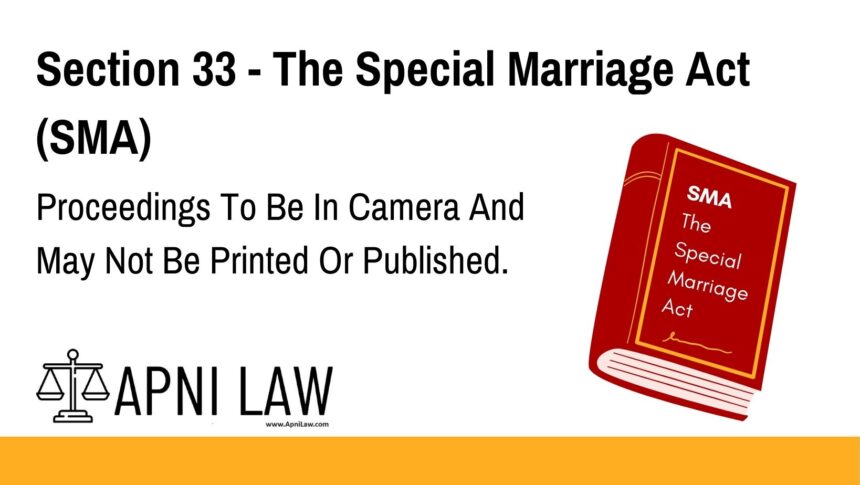Code: Section 33
Every proceeding under this Act shall be conducted in camera and it shall not be lawful for any person to print or publish any matter in relation to any such proceeding except a judgment of a High Court or of the Supreme Court printed or published with the previous permission of the Court.
Explanation of Section 33 – Special Marriage Act
Section 33 of the Special Marriage Act mandates that all legal proceedings under the Act be held “in camera.” This means the proceedings are conducted privately—without public or media access—in order to protect the dignity, privacy, and reputation of the parties involved.
Additionally, the section prohibits the publication or printing of any details of such proceedings, except judgments of the High Court or Supreme Court that are specifically permitted for publication by the Court.
Key Provisions:
- All proceedings under the SMA (e.g., divorce, annulment, judicial separation) must be held in private.
- The media and public are barred from attending these proceedings.
- Publishing or printing any content about these cases is illegal, unless:
- The case is decided by the High Court or Supreme Court, and
- The Court has granted explicit permission for the judgment to be published.
This provision helps prevent public embarrassment, misuse of sensitive information, and media trials that can affect the dignity of the individuals involved.
Illustration
Example 1: Privacy in a Divorce Case
A couple undergoing a contested divorce under the Special Marriage Act appears in court. As per Section 33, the hearing is held in camera—meaning only the parties, their lawyers, and the judge are present. No public or media personnel are allowed.
Example 2: Media Publication Without Permission
A tabloid publishes the allegations made by a petitioner during a divorce case. This is a violation of Section 33 unless it was a High Court or Supreme Court judgment published with prior permission.
Common Questions and Answers on Section 33 SMA
Q1. What does “in camera” mean in a legal proceeding?
“In camera” means the court conducts the proceedings privately, without the presence of the public or media. This is done to protect the parties’ privacy, especially in sensitive family law matters.
Q2. Can media report on SMA proceedings?
No. Media reporting or publishing any matter related to such proceedings is prohibited, except judgments of the High Court or Supreme Court and only if permitted by the Court.
Q3. Are judgments in such cases always kept private?
Not always. Judgments of the High Court or Supreme Court may be published—but only with prior permission from the Court.
Q4. What happens if someone violates Section 33?
Publishing or printing restricted content may lead to contempt of court proceedings or other legal consequences under Indian law.
Conclusion
Section 33 of the Special Marriage Act is a vital safeguard that ensures matrimonial proceedings are conducted with discretion and dignity. It balances the public interest in transparency with the individual’s right to privacy—particularly in emotionally and socially sensitive matters.
For more legally sound interpretations of matrimonial law, visit ApniLaw.








